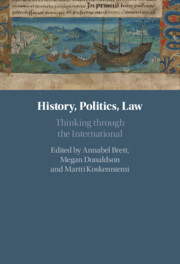Introduction - History, Politics, Law
Thinking through the International
Published online by Cambridge University Press: 28 September 2021
Summary
It would be difficult to find a major figure in the history of European political thought who would not have attempted to say something about how authority emerges, or is justified and critiqued, in the world beyond the single polity. Quite frequently, that effort would have involved some idea about a legal order, or at least a set of rules or regularities applicable in that world. Thomas Hobbes was neither the first nor the last major thinker who believed that the ‘international’ realm was characterised by the independence of states existing ‘in the state and posture of gladiators’, thus apparently denying that legal rules or practices or legal thinking could have much relevance therein. Yet others believed, as Immanuel Kant did, that without a constitutional vocabulary not much that was meaningful could be said about the human pursuit of freedom, and that silence about the latter would not only constitute a moral failure but an intellectual and perhaps political mistake. For a long time, the idiom of natural law claimed to offer a universally valid frame for thinking about the nature of the political, as well as providing authority for lawyers’ speculations about the rules and principles governing the conduct of individuals and corporate bodies wherever they might move. The name of the relevant discipline at German universities from the late seventeenth century onwards – ius naturae et gentium, the law of nature and of nations – revealed the full scope of its ambition. That discipline may have died away (although that is a debatable proposition) but any political thinking worth its salt will today (perhaps especially in the twenty-first century) aim to say something about how authority emerges, is maintained or critiqued not only within but also outside the single state. The world of ‘nations’ or even ‘humanity’ is established as an important theme of political and legal speculation.
- Type
- Chapter
- Information
- History, Politics, LawThinking through the International, pp. 1 - 16Publisher: Cambridge University PressPrint publication year: 2021
- 2
- Cited by



